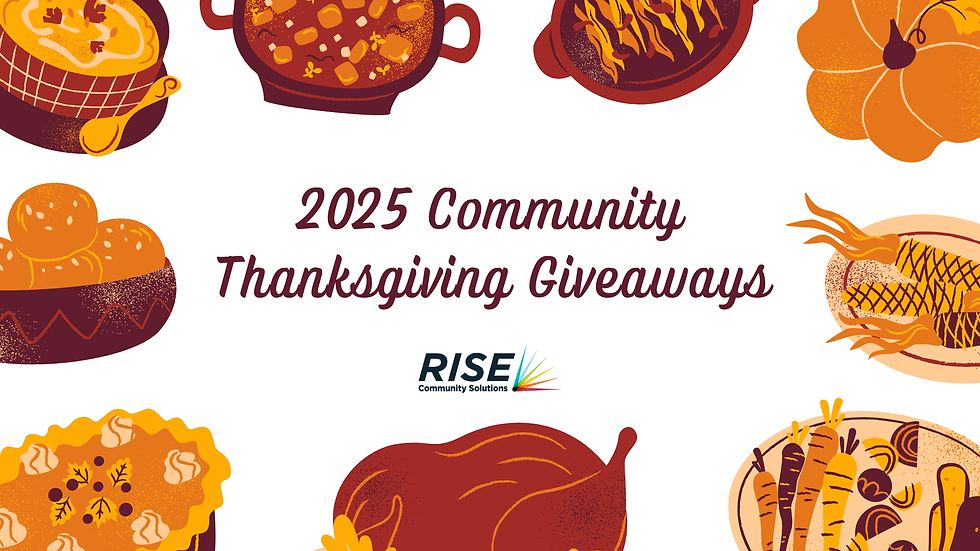Here's Why #MentalHealthMatters to Our Team
- RISE Community Solutions

- May 23, 2024
- 4 min read
Although May is Mental Health Awareness Month, RISE Community Solutions (especially our Breakthrough team) provides mental health supports, resources, and education all year long. In honor of #MentalHealthAwarenessMonth, our Family Support Navigators are sharing their own stories about why mental health matters to #EndTheStigma.
_______
Although my teenage years consisted of the general growing pains that typically accompany peer pressure and puberty, the not-so-typical struggle that I faced was that of learning to cope with a mother that had become addicted to drugs. There was a heavy weight of shame and embarrassment that often gave way to anger and aggression as a coping/non-coping mechanism on both of our parts. Looking back, I wish I had known more about mental health, addictions, and the behaviors that follow. I have come to learn that having intricate knowledge and being able to genuinely empathize with people will allow you to better understand and administer the necessary assistance to the people who need it the most, and in some cases, those people can also be the people that you love the most.
______
In my journey I remember feeling so alone. It was really hard being in an area where services were very hard to come by. The closest therapist was almost two hours away and they kept leaving for a better position five hours away or to a different state all together. It got to the point where my girls just didn't want to see anyone because they had to start from scratch each time. It was at the height of all that I learned (through my pastor) that our words have so much power and I started changing the words I used and the tones I used to speak with them, which then started a change within our relationship and within themselves. The journey is still a very long one. When we moved to Florida, both of the girls started seeing their own therapist again and are now well on their way to recovery. The future looks bright and having support helps so much.
_______
One of the things that made a huge difference in the atmosphere at home and the quality of life in my home was taking the Family-to-Family class with NAMI. I had gotten to the point of not knowing how to cope with my child's mental health condition and behaviors. At the class, I was able to meet other parents who were going through similar challenges. The two most impactful things for me from taking the class were being able to intellectually understand my daughter's symptoms and learning tools to respond to those symptoms. My personal stress level went down significantly. It took me a while to get good at using the new strategies for coping with behaviors, but I kept at it, and I continue to use those same tools to this day.
_______
When my child was struggling, I realized my silence was helping to perpetuate the issue, so the eye opener for me as a mother was to identify that there was a problem, and then not ignoring it. Then, I educated myself on the issue and how I could support my child to navigate through this crisis. From there, I started assuring her that there was nothing to be embarrassed or ashamed about and it was ok to get help.
_______
Navigating the mental health system during a crisis can feel overwhelming, especially when a loved one is involved. From personal experience, I understand the confusion and helplessness that can arise. When my son faced his first mental health crisis at just 10 years old, it marked the beginning of a challenging journey through adolescence and into adulthood. Each incident taught us the importance of precise communication, especially during emergency calls, to ensure the situation was handled with the necessary care rather than escalated unnecessarily.
The stark difference between handling such crises during youth and adulthood became painfully clear. In 2021 I would be faced with my son unable to handle the traumatic experience of his close friend's murder. My son needed mental health crisis stabilization but getting help as an adult looked very different from a youth Baker Act. As a minor, my son's care involved me directly, but transitioning into adult care meant being left without any information or say in their treatment plan, a situation any parent would find distressingly opaque. It's a system that seems unprepared to offer the reassurance and involvement family members desperately need. But there are good days ahead, and I know firsthand that with the right knowledge and support, my son and I can advocate to get him the help he deserves.
_______
If you or someone you love is struggling, please view our community Mental Health & Substance Use Resource Page.
Breakthrough uses a peer support model to support families with youth, ages 9 to 17, who are experiencing significant mental or behavioral health needs, with a goal of reducing re-hospitalizations and increasing stability for youth and their families. All of Breakthrough's Family Support Navigators are Certified Peer Recovery Specialists, whose own experiences caring for loved ones with mental health needs allow them to uniquely connect with and support our youth's caregivers.
.png)




Comments